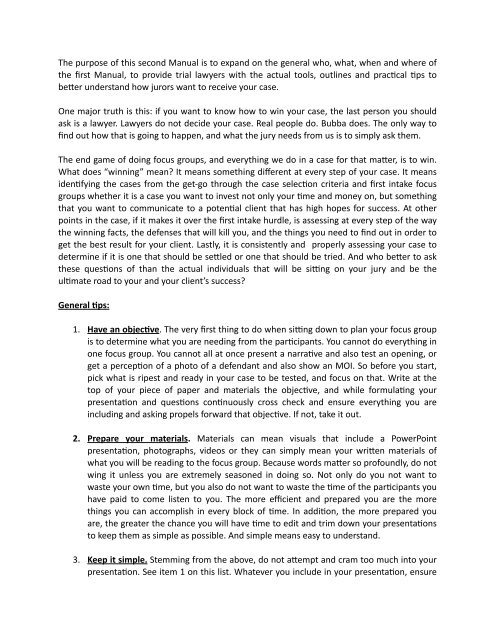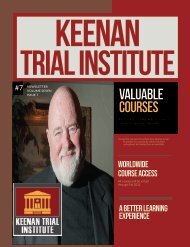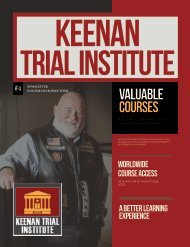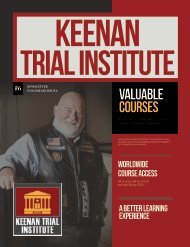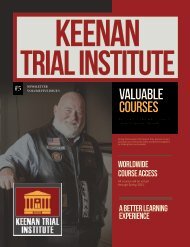FOCUS GROUPS BOOK
Create successful ePaper yourself
Turn your PDF publications into a flip-book with our unique Google optimized e-Paper software.
The purpose of this second Manual is to expand on the general who, what, when and where of<br />
the first Manual, to provide trial lawyers with the actual tools, outlines and pracIcal Ips to<br />
bePer understand how jurors want to receive your case.<br />
One major truth is this: if you want to know how to win your case, the last person you should<br />
ask is a lawyer. Lawyers do not decide your case. Real people do. Bubba does. The only way to<br />
find out how that is going to happen, and what the jury needs from us is to simply ask them.<br />
The end game of doing focus groups, and everything we do in a case for that maPer, is to win.<br />
What does “winning” mean? It means something different at every step of your case. It means<br />
idenIfying the cases from the get-go through the case selecIon criteria and first intake focus<br />
groups whether it is a case you want to invest not only your Ime and money on, but something<br />
that you want to communicate to a potenIal client that has high hopes for success. At other<br />
points in the case, if it makes it over the first intake hurdle, is assessing at every step of the way<br />
the winning facts, the defenses that will kill you, and the things you need to find out in order to<br />
get the best result for your client. Lastly, it is consistently and properly assessing your case to<br />
determine if it is one that should be sePled or one that should be tried. And who bePer to ask<br />
these quesIons of than the actual individuals that will be siZng on your jury and be the<br />
ulImate road to your and your client’s success?<br />
General 6ps:<br />
1. Have an objec6ve. The very first thing to do when siZng down to plan your focus group<br />
is to determine what you are needing from the parIcipants. You cannot do everything in<br />
one focus group. You cannot all at once present a narraIve and also test an opening, or<br />
get a percepIon of a photo of a defendant and also show an MOI. So before you start,<br />
pick what is ripest and ready in your case to be tested, and focus on that. Write at the<br />
top of your piece of paper and materials the objecIve, and while formulaIng your<br />
presentaIon and quesIons conInuously cross check and ensure everything you are<br />
including and asking propels forward that objecIve. If not, take it out.<br />
2. Prepare your materials. Materials can mean visuals that include a PowerPoint<br />
presentaIon, photographs, videos or they can simply mean your wriPen materials of<br />
what you will be reading to the focus group. Because words maPer so profoundly, do not<br />
wing it unless you are extremely seasoned in doing so. Not only do you not want to<br />
waste your own Ime, but you also do not want to waste the Ime of the parIcipants you<br />
have paid to come listen to you. The more efficient and prepared you are the more<br />
things you can accomplish in every block of Ime. In addiIon, the more prepared you<br />
are, the greater the chance you will have Ime to edit and trim down your presentaIons<br />
to keep them as simple as possible. And simple means easy to understand.<br />
3. Keep it simple. Stemming from the above, do not aPempt and cram too much into your<br />
presentaIon. See item 1 on this list. Whatever you include in your presentaIon, ensure


